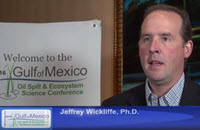The Toxicological Properties of Specific Aromatic Hydrocarbons Isolated from Fresh and Aged Crude Oil from the Deepwater Horizon Spill project is lead by Charles Miller, Tulane University.
The scientific goal of this research is to elucidate the highly toxic compounds within fresh and weathered crude oil from the MC252 oil spill. The hypothesis of this research proposal is that a relatively small group of the chemicals in oil accounts for most of the toxicity. Learning the identity of these highly toxic compounds will lead to better predictions of the toxic
properties of fresh crude oil and will provide a way to follow these substances as oil weathers in the environment. Oil residues from various sites differ in their composition and toxic activity. Furthermore, oil constituents change dramatically with time and weathering. The ability to identify and quantitate the key toxic compounds in oil will permit predictions of adverse human health effects and ecotoxicity in the future.
In human and environmental risk assessment studies, the first steps are hazard identification and dose-response analysis. Oil spills are well recognized for causing toxic effects in people and environmental organisms. However, oil is chemically complex and the specific compounds that contribute to its toxicity are surprisingly poorly defined. Polycyclic aromatic hydrocarbons (PAHs) represent a large family of toxic chemicals in oil. PAHs have received considerable attention from scientists. However, most of this previous research has focused on the PAHs produced by combustion (pyrogenic products), and these are not well represented in oil. The petrogenic PAHs in oil are distinct in that they are generally alkylated and most have never been evaluated for toxicity. A review article from this research team (Envir. Health Perspect. 122, 6-9, 2014) highlighted the need for toxicological characterization of the PAHs and other toxic chemicals (e.g. benzothiophenes, naphthaenoaromatics, etc.,) in oil. The marriage of analytical chemical methodologies with cellular bioassays to identify the highly toxic compounds within fresh and weathered oil samples will help to fill this knowledge gap.
Click for access to GoMRI’s YouTube videos of RFP-V Projects…
************
This project was funded by the Gulf of Mexico Research Initiative (GoMRI) in the RFP-V funding program.
The Gulf of Mexico Research Initiative (GoMRI) is a 10-year independent research program established to study the effect, and the potential associated impact, of hydrocarbon releases on the environment and public health, as well as to develop improved spill mitigation, oil detection, characterization and remediation technologies. An independent and academic 20-member Research Board makes the funding and research direction decisions to ensure the intellectual quality, effectiveness and academic independence of the GoMRI research. All research data, findings and publications will be made publicly available. The program was established through a $500 million financial commitment from BP. For more information, visit http://gulfresearchinitiative.org/.

